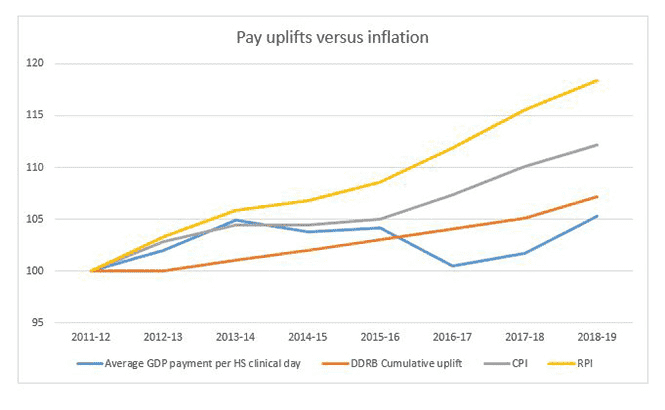The report shows that there was a real-terms decline of 11.4% in average GDS Health Service earnings per day between 2011/12 and 2018/19.
Jointly compiled by BSO, Health and Social Care Board, the Department of Health and BDA, this report makes clear that there has been a significant real-terms erosion of GDS earnings. Crucially, this erosion cannot be explained by changes in GDP working patterns. The report provides significant additional evidence that the GDS payment system was unsustainable even before COVID, making it clear that a new GDS contract is urgently needed.
Here are some of the report’s key findings:
- Between 2011/12 and 2018/19, average annual Health Service earnings for Principals fell from £137,962 to £124,623 (-10%).
- Associate average annual Health Service earnings increased slightly from £81,877 to £84,565 (+3%).
- Both Principals and Associates recorded significant drops in average earnings between 2013/14 and 2017/18 due to the phased withdrawal of commitment payments and the decision not to award a pay uplift in 2015/16.
- Between 2011/12 and 2018/19, the average number of Health Service clinical days – not including administrative days – worked by Principals fell from 189 to 169 (-10%).
- The number of clinical days worked by Associates fell from 167 to 155 (-7%).
The Department of Health has long used this fall in the average number of Health Service clinical days worked by GDPs as an explanation for falling earnings. However, the report demonstrates that between 2011/12 and 2018/19, average earnings per Health Service clinical day worked by all GDS dentists increased by barely 5% over 9 years.
This miserly increase equates to a significant 11.4 % real-terms decline in average GDS Health Service earnings per day.
GDP payments per day in comparison to inflation (Northern Ireland)

Preserving the financial sustainability of the GDS
Your representatives on the NI Dental Practice Committee have written to the Review Body on Doctors' and Dentists' Remuneration to apprise them of the report’s publication and ask that its findings be used to inform the 2021/22 dental pay award.
Today NIDPC representatives are meeting Louise McMahon, the HSCB Director of Integrated Care to discuss the financial sustainability of the GDS. We will also be sharing evidence of the erosion of dental earnings with the Minister for Health, the NI Assembly Health Committee, and other key stakeholders to reiterate the financial challenges facing the GDS ahead of the 2021/22 budget being set.
To preserve the financial sustainability of the General Dental Service we are asking that the HSCB and Department of Health immediately implement the following steps:
- Step 1: Provide GDP’s with early reassurance that the current Financial Support Scheme arrangements will continue throughout 2021/22 at the same, or greater, level as 2020/21.
- Step 2: Provide long overdue financial support to private high street dentistry.
- Step 3: Provide additional, targeted, financial support to facilitate increased GDS activity (within physical limits) to address the patient backlog. This could include establishing a Revenue Grant Scheme to help GDPs cover the cost of installing better ventilation, and a reformed PPE funding model that does not place a financial barrier on increasing activity.
- Step 4: Take action to improve GDS morale and address pre-COVID underlying issues by: a) immediately implementing the 2020/21 pay award; b) re-introducing Health Service commitment payments; c) urgently rebuilding Out of Hours Dental Services; and d) publicly committing to the implementation of a new GDS contract by April 2022. This contract should support Health Service dentistry to become financially viable in its own right without needing to be subsidised by private dentistry.
We continue to advocate on your behalf to build a financially sustainable GDS fit for the future. You can keep in touch with the latest developments on our live updates page.
